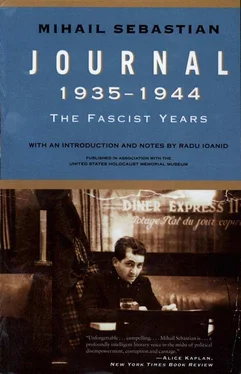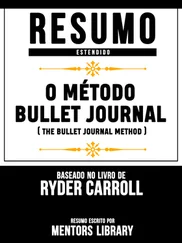Sebastian understood that Nae Ionescu was an opportunist even when it came to his Iron Guard credo, yet the Jewish writer continued to have mixed feelings for the fascist philosopher—“fondness, irritation, doubts, repugnance.” When in May 1938 Nae Ionescu was arrested and interned in a concentration camp precisely for his activities as a leader of the Iron Guard, Sebastian was distressed and worried. He continued to try to explain Ionescu’s political actions as a “miscalculation,” due to “half farce, half ambition.” In March 1940, when Nae Ionescu died, Sebastian sobbed uncontrollably, viewing his death as a defeat and an injustice.
Nae Ionescu and his followers hoped that the Iron Guard ideology, with its odd mixture of anti-capitalism, anti-Semitism, and anti-communism, would constitute the solution to Romania’s problems. Nae Ionescu, as the political scientist Marta Petreu put it, “. . prepared and influenced part of the young intellectuals towards the Christian-Orthodox legionary ideology. It is certain that Nae Ionescu’s influence. . had an impact on the most cultivated segment of the young pro-legionary intelligentsia. . In the articles of the young legionary intellectuals one finds all the ingredients of this doctrine: attacks against the democratic state and against liberalism, the assertion of heavy nationalism, the rejection of the Western world, the idea of the legionary dictatorship, the ongoing national revolution (following the model of the ongoing fascist revolution), the exaltation of the Orthodox Christianity, etc. The more obscure and mystical an idea of the legionary doctrine, the more successful it was with the pro-legionary young intelligentsia.” Sebastian’s diary provides a sort of x-ray of this barbarization of the Romanian intelligentsia during these dictatorships. By 1937 Sebastian no longer preserved many illusions about his friends who had become members of the Iron Guard. Still, he continued to socialize with them, acknowledging in his diary how painful the situation was becoming.
Anti-Semitism was a prevailing theme in the writings of these young intellectuals. They blamed the Jews for everything they perceived to be wrong in Romanian society: liberalism, poverty, syphilis, alcoholism, communism, prostitution, procurement, abortion, homosexuality, socialism, feminism. Before the appearance of the first Romanian anti-Semitic government, Sebastian witnessed the increase in anti-Semitism not only among the Romanian intelligentsia but on the streets of Bucharest itself. In June 1936 he vividly described this phenomenon, advocating Jewish self-defense as a response. When the anti-Semitic Goga-Cuza government was installed at the very end of 1937, Sebastian saw immediately where the country was heading, noting that official speeches as reported in the press for the first time contained the terms “yid” and “Judah’s domination.” He correctly anticipated the review of citizenship for Jews and rightly predicted that he would lose his job because he was a Jew.
One of Sebastian’s closest friends, Mircea Eliade, became rabidly anti-Semitic under the influence of the Iron Guard. A well-known journalist and novelist in Romania between the wars, after World War II Eliade made an exceptional career for himself at the University of Chicago as a historian of religions. Unlike other famous representatives of his generation, however, Eliade never acknowledged his past as an Iron Guard ideologist and is not known ever to have expressed regret for his involvement with this fascist organization.
In the Romanian press Eliade published stridently anti-Semitic attacks. “Is it possible,” he asked, “that the Romanian nation will end in the most miserable disintegration in history, eaten by poverty and syphilis, invaded by Jews and torn by aliens, demoralized, betrayed and sold for a few million lei?” This outburst from December 1937 was characteristic. About two months earlier, Eliade had plunged into a long xenophobic exhortation, reproaching the authorities for their tolerance toward the Jews, writing, “We didn’t lift a finger while we watched the Jewish element strengthening in the Transylvanian towns. . Since the war the Jews have invaded the villages of Maramures and Bukovina and have obtained an absolute majority in all Bessarabian cities. . I very well know that the Jews will shout that I am an anti-Semite and the democrats that I am a hooligan or a fascist. . I am not a bit annoyed when I hear the Jews shouting: ‘anti-Semitism,’ ‘fascism,’ ‘Hitlerism.’”
In typical Iron Guard fashion, Mircea Eliade called for violence against the adversaries of his movement. In 1936 he erupted during a conversation with Sebastian, advocating the execution of the pro-Western Romanian foreign minister Nicolae Titulescu: “He should be. . riddled with bullets. Strung up by the tongue.”
If in 1936 Sebastian was still trying to “do everything possible to keep” Eliade as a friend, by March 1937 he seemed to acknowledge that such a friendship was becoming impossible: “We don’t see each other for days at a time — and when we do, we no longer have anything to say.” During the same years Sebastian described himself as “horrified” that Eliade had participated in the Iron Guard electoral campaign. At the same time, when in August 1938 Eliade was arrested for his Iron Guard activities, Sebastian worried and explained Eliade’s behavior as “childish nonsense.” Friends in high positions soon appointed Eliade to positions abroad, where he remained out of harm’s way.
When Eliade was appointed to diplomatic posts (first in London and then in Lisbon), Sebastian wrote bitterly about his friend who, as he saw it, had betrayed him and who never visited him during the war. Successes, even when resulting from moral infamy, remain successes,” Sebastian wrote. Eliade’s opportunism is perhaps best revealed by the fact that he served in three conflicting governments, one right after another, beginning with the dictatorship of King Carol II, who executed C. Z. Codreanu (the leader of the Iron Guard and Eliade’s idol) and whose regime eventually put Eliade into a camp. Eliade also served General An-tonescu’s governments, with and without the Iron Guard.
Another strong supporter of the Iron Guard among Sebastian’s friends was E. M. Cioran, a brilliant writer and philosopher who in his Parisian exile after the war would openly regret his “pact with the devil.” Earlier, with fascism ascending, he had written, “There are few people, even in Germany, who have a greater admiration for Hitler than I do.” Despite this, Sebastian described him in January 1941 as “interesting. ., remarkably intelligent, unprejudiced, and with. . cynicism and idleness combined in an amusing manner.”
Dinu (Constantin) Noica, a thinker who after the war created a non-Communist school of thought that was tolerated by the Ceausescu regime, joined the Iron Guard in December 1938; he too was a friend of Sebastian. In autumn 1940 he found himself in power with his fellow Legionaries. Noica then admonished Romania to discover anti-Semitism before it was too late, and he spread the ultra-nationalistic hate doctrine of a murderous regime that he claimed he would never disavow.
Like Sebastian’s other friends, the theatre director Haig Acterian became an active member of the Iron Guard, participating in the January 1941 anti-Antonescu rebellion that, in its anti-Semitic excesses, could be said to be Romania’s equivalent of Germany’s Kristallnacht. In 1936 Sebastian was amazed by Acterian’s adoration of Corneliu Codreanu, the Iron Guard leader, reminding himself that “in 1932, Haig was a Communist.” As Sebastian’s diary unfolds, the reader senses his vanishing hope that what was happening to his friends was nothing more than an accident, that they would again become “normal” people.
Читать дальше











